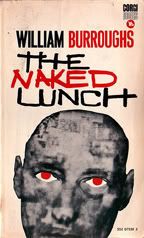 More recently, bolstered by a diet of Bukowski and having read a quite interesting biography of Burroughs, I thought I'd try it again. This time the book opened itself up to me. I'm still not quite sure if I "liked" it in the traditional sense of reading a book, but I can't quite stop thinking about it.
More recently, bolstered by a diet of Bukowski and having read a quite interesting biography of Burroughs, I thought I'd try it again. This time the book opened itself up to me. I'm still not quite sure if I "liked" it in the traditional sense of reading a book, but I can't quite stop thinking about it. The key to "Naked Lunch" is realising that it isn't a traditional narrative, that there is no end or beginning really, and that it's basically the drug-stewed mind of Burroughs spinning forth in a frequently vile, hallucogenic rant loosely tied together by a few recurring themes. It's hard to put aside all the narrative preconceptions you bring to reading, but once you slide into "Lunch's" strange and slithery rhythms you kind of get what's being attempted here, closer to a prose poem than a novel. It's the sex and drugs that puts a lot of people off "Lunch," and it's without a doubt not for the timid -- I consider myself fairly unshockable but several passages in "Lunch" push one to the limit. It is a book without an ounce of comfort in it. You later learn many of the most shocking passages, the mass orgies/massacres and such, are meant to be a metaphor for capital punishment. Not sure how well it works at that, but as a general "look how terrible man can be to man" sort of screed, it does the job.
 "The sailor's face dissolved. His mouth undulated forward on a long tube and sucked in the black fuzz, vibrating in supersonic peristalsis disappeared in a silent, pink explosion."
"The sailor's face dissolved. His mouth undulated forward on a long tube and sucked in the black fuzz, vibrating in supersonic peristalsis disappeared in a silent, pink explosion."Ostensibly it's "about," if anything, the drug subculture in Burroughs' imaginary "Interzone" -- based on the expatriate Tangiers community Burroughs lived in during the depths of his drug addiction in the 1940s and 50s. Characters appear and disappear; chapters were apparently randomly assembled from the huge pile of manuscript Burroughs had written. There are moments of blackest humour that pass in between the visions like bone-dry chuckles. All but a few sentences of the novel may just be a vivid halluciation.
What sticks with you is Burroughs' foul, snakelike, ellipsis-filled, wandering prose -- like a David Lynch movie, it's more about setting a mood than a straight plot A to plot B movement. It assaults you, bombards you with grotesqueries. It's like listening to Captain Beefheart - if I'm in the right mood, it works, but it's not everyday cuisine. In between the slime and sleaze there are glittering shards of prose beauty, men with eyes like insects and gibbering protoplasmic spasms. Is it a 'comfortable' reading experience? Absolutely not, but somehow between the viscera and abominations it stirs you, leaves you different than you were before.

No comments:
Post a Comment